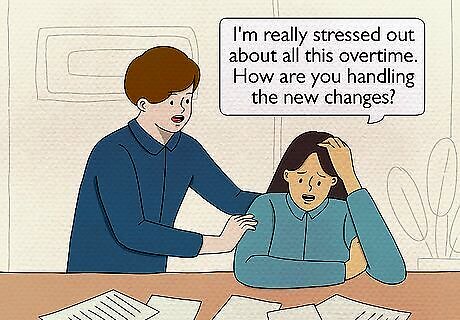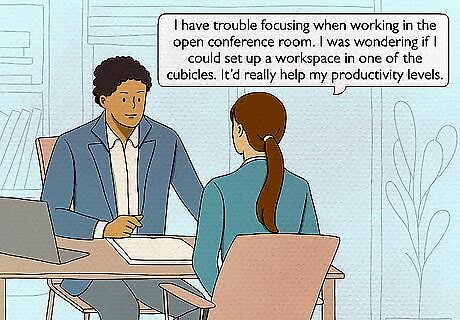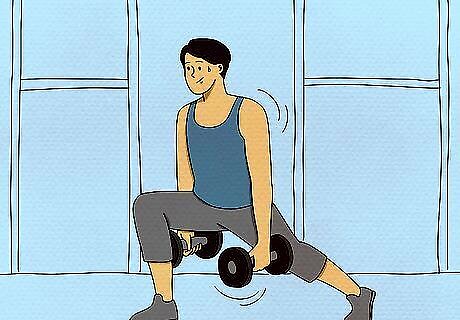
views
Changing Your Mindset and Behaviors

Take breaks often. Make a habit of taking several 10 to 15-minute breaks throughout the day to combat the pressure and frustration you feel. Visit with a coworker, refill your water bottle, or step outside for a breath of fresh air. High-pressure work environments often involve some level of competitiveness, which means you might try to stay at your desk the entire shift and push yourself harder and harder. Taking a short breather can actually benefit your work performance, however. If you can’t manage a longer break, get up for just 5 minutes at a time. You’ll find that you’ll feel more focused and productive afterwards, making the break well worth your time.

See tough tasks as games. Shift your perspective about what you’re doing and you may feel less pressure. Try looking at a difficult job as a game or competition of sorts. Set a personal deadline or strive to beat your best time. For example, if your boss is breathing down your neck about getting a project done by the end of the workday, imagine that each task you complete is helping you destroy a fire-breathing dragon (i.e. your boss). If you get the project done on time, you conquer the dragon! By looking at your work this way, you’ll likely get more done while feeling less stressed in the process.

Let go of perfectionism. Sometimes the pressure you feel about your job is internal. If you have really high standards for every piece of work that leaves your desk, you could be making your work environment more stressful than it has to be. Aim for done, not perfect. Start by prioritizing which tasks you’ll give the most time and energy to. For the others, just do them—don’t worry about giving 100% on every task. Another way to overcome perfectionism is to judge how the things you’re stressed about will matter in the long run. For instance, if you’re worried about choosing the perfect font on a work document, ask yourself how important that really is.

Be willing to say “no.” Do you have a tendency to overcommit by saying “yes” to every request your coworkers or boss makes? Challenge yourself to start declining demands that don’t serve you and setting stronger boundaries. Be polite, but firm. Say something like “I can’t. I’m already in over my head with the Anderson project. Maybe Chris could help you?”

Remember your “why.” The pressure can feel overbearing when you have become disconnected from your purpose. Reflecting on why you do the work you do or why your job is important can help lighten your mental load. Think about why your work is valuable. Who does it help or benefit? Your purpose can serve as an anchor when things get stressful at work.
Getting Support

Ask for help when you need it. If you’re bogged down, reach out to someone for assistance. Ask a coworker to give you a hand with a challenging task or talk to your supervisor about how you can divvy up big projects. Don’t feel shy about asking for help—typically, others are more than happy to lend a hand when needed. Say, “Hey, Joe, I know you’re really good at programming. Do you mind giving this a look before I submit it to the client?”

Speak to a trusted coworker. If you’re feeling pressured, chances are other employees are, too. Talk to someone you can trust about the pressure you feel. You can exchange work stories and offer support to one another when things get out of hand. You might say, "I'm really stressed out about all this overtime. How are you handling the new changes?"

Have a candid talk with your boss if the pressure becomes too much. Ask your supervisor for a one-on-one meeting to discuss the situation if the pressure starts to affect your health or your ability to perform. Let them know what’s happening and work together to brainstorm solutions. You might say something like, “I have trouble focusing when working in the open conference room. I was wondering if I could set up a workspace in one of the cubicles. It’d really help my productivity levels.” Your employer wants you to be at peak performance, so they’ll likely be happy to accommodate any changes or offer any support to help you do your job better.

Develop healthy relationships outside of work. The daily grind can consume your life to the point that you rarely connect with people who don’t work with you. Make an effort to spend time—at least once of week—with non-coworkers. Call up that friend you’ve been neglecting and ask them to hang out. Plan a fun outing with your family over the weekend or participate in local clubs or organizations relating to your hobbies.

See a counselor. Instead of letting the pressure become unbearable, talk to a professional who can listen and offer practical advice for managing stress at work. Check if your employer has an Employee Assistance Program that offers mental health services. Pressure at work can build up to the point that you feel depressed or anxious. Feeling this way without getting help can lead to burnout and resentment for the work you do.
Dealing with Stress

Take time to relax after a stressful work day. Incorporate relaxation into your daily routine to better manage the pressure you feel at work. Practice calming strategies like deep breathing, mindfulness meditation, or progressive muscle relaxation. Perform self-massage, take a warm bath after a long day, or listen to soothing music. Techniques like deep breathing and progressive muscle relaxation can be applied anytime, even when you’re on the clock during the workday.

Workout regularly to ease tension. Physical activity not only supports your health and wellness, but it can also be an effective antidote for stress. Get a gym membership and plan to go before or after work each day. However, you can also go for a run in your neighborhood or practice yoga on your living room floor.

Get plenty of sleep and get to work early. Support your mental health and ensure you’re fully charged by getting 7 to 9 hours of sleep per night. You’ll wake up refreshed and able to beat the heavy traffic and arrive at work early. If you’re lacking sleep and showing up to work groggy and irritable, anything that happens at work will feel overwhelming. Improving your sleep habits will make work more bearable. Improve your sleep by going to bed and rising at the same times each day. Shut off your tech devices at least an hour before bed to help you unwind. Try reading or listening to calming music instead.

Establish set times to unplug. Pressure from work doesn’t just happen when you’re on the premises. If you let it, it can follow you home and interfere with your leisure time. Set firm hours when you don’t return work calls or emails and stick to them. For example, you might choose to answer work-related emails only when you are on the premises. You might tell your coworkers and supervisor that after 7pm, you can’t take calls because you’re with your family.

Plan a getaway. Vacations can be a great way to switch up the status quo and allow you to decompress from work stress. Your “vacay” doesn’t necessarily have to be to some faraway destination, though. Even just a short weekend trip can refresh you and give you a new perspective. Get creative and plan an exciting trip to a nearby city, visit museums in your own town, or go camping in your backyard.


















Comments
0 comment